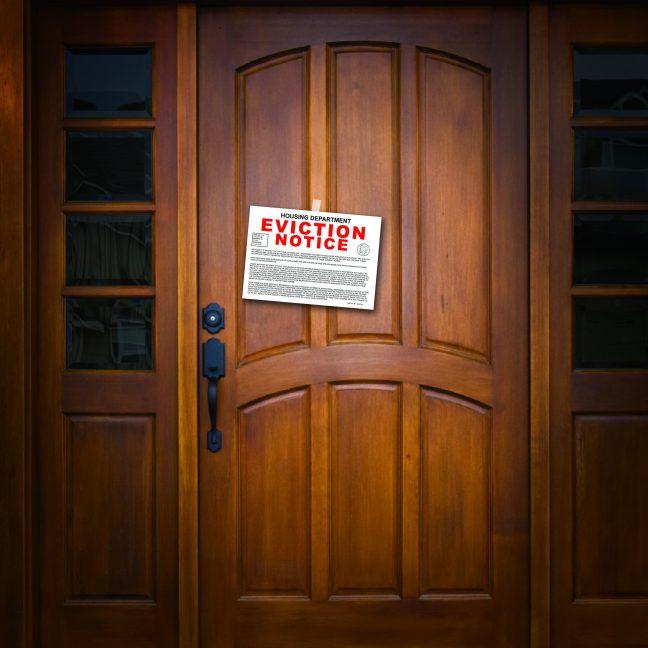The Supreme Court has blocked the Biden administration’s attempt to extend the eviction moratorium, allowing evictions to resume nationwide.
The Supreme Court voted six-to-three to end the moratorium Aug. 26, with the lone three liberal justices dissenting, according to their official decision. The Centers for Disease Control and Prevention, with support from the Biden administration, had extended the nationwide eviction moratorium until Oct. 3 due to surging COVID-19 cases.
The CDC had signed an order for the moratorium to be extended until Oct. 3 in areas with substantial and high transmission of the coronavirus, according to the official moratorium. The Supreme Court struck down this order, citing that the CDC did not have the authority to extend a ban on evictions in their decision.
The CDC originally enacted the eviction moratorium to keep people housed who may have been out of work or facing financial hardships due to COVID-19, as well as to reduce transmission in low-income communities, where many community members were at risk of ending up in homeless shelters, according to Congressional Research Service.
District 8 Alder Juliana Bennett said she has firsthand experience with financial struggles in paying rent.
“I was personally afflicted several times this year with having to decide if I was going to pay rent or if I was going to get food this month,” Bennet said. “That is a devastating question to be asking yourself. I am glad we had [the eviction moratorium] for the peace of mind.”
In Wisconsin, the moratorium cut the number of evictions landlords filed in half, according to the Department of Administration.
In Dane County in 2019, 24% of households spend over 50% of their income on rent, which classifies them as extremely cost-burdened, according to the Morgridge Center for Public Service.
University of Wisconsin Clinical Law Professor Mitch said evictions are likely to increase now that the moratorium ended.
“Individual counties in the state of Wisconsin can’t make their own moratoriums on eviction, but there is a lot of aid available to prevent it in most cases,” Mitch said.
In the Madison area, there is a wide range of resources for individuals to utilize who may be facing eviction, according to the City of Madison website. For UW students, the Dean’s Office and the Office of Student Financial Aid can help with grants and loans to pay rent, even for those living off-campus, according to the UW financial aid website.
The university is equipped with federal money through the Higher Education Emergency Relief Fund, according to the U.S. Department of Education. A COVID-19 relief bill for students and institutions, HEERF aims to help students who have been facing hardships as a result of the pandemic.
The Tenant Resource Center is another Madison organization that helps tenants through legal and financial struggles. In the case of an eviction moving to court, the Tenant Resource Center can help provide legal representation, according to the their website. They also run Dane CORE, a rental assistance program with $15 million in federal funds to help Dane County residents who are facing financial hardships, according to their website.
“Eviction takes a lot of time, is costly and normally landlords would prefer to settle up than go through the entire process of evicting someone,” Bennet said. “I am not saying ‘don’t pay your rent,’ — don’t do that. But I hope that it eases some minds. If you have to go through that battle I would strongly encourage reaching out to the Tenant Resource Center.”
In the state of Wisconsin, all evictions must be presented to a judge, according to the Department of Agriculture, Trade and Consumer Protection. But most judges will adjourn the eviction, and aid will be provided to the landlord and the tenant, Mitch said.
While the Supreme Court ruling may have caught tenants off guard, evictions will not immediately occur in Wisconsin, Mitch said.
“It doesn’t make sense for landlords to see evictions through,” Mitch said. “They can’t profit off it. If they apply for aid, both parties can get money and it is a better situation. Landlords want to avoid them.”
Though it remains to be seen how the end of the eviction moratorium will affect tenants, the moratorium did prevent at least 1.55 million eviction filings nationwide, according to eviction research center Eviction Lab.
Meanwhile, nationwide rental assistance distribution continues to increase as the pandemic continues, according to The White House. Dane county has given out roughly $11 million of $15 million in federal rental assistance as of Aug. 1, though another roughly $28 million is on the way, according to the Wisconsin State Journal.
“I know that the eviction moratorium has been extremely vital for lower income neighborhoods, areas like the south side of Madison, for example, where people are struggling to get by,” Bennett said. “I hope people are aware of and utilize the resources available for them.”


